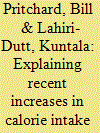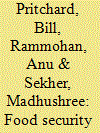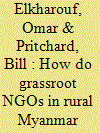|
|
|
Sort Order |
|
|
|
Items / Page
|
|
|
|
|
|
|
| Srl | Item |
| 1 |
ID:
165089


|
|
|
|
|
| Summary/Abstract |
During the past decade, considerable research efforts have sought to explain India’s “calorie consumption paradox”, namely, the coexistence of a decline in average per capita calorie intake in rural India alongside increased material living standards. Evidence from the most recent (68th) round of the National Sample Survey (NSS), released in 2014, however, indicates increases in calorie intake, notably among poorer income quintiles. This paper argues that the turnaround in these data is linked to the improved performance of pro-poor social protection measures. Analysis of data suggests a close association between states that have made the greatest improvements in social policy delivery systems, and increased calorie intake for the poorest quintile of rural populations. This conclusion supports wider international evidence on the importance of social protection strengthening for nutrition-sensitive economic growth.
|
|
|
|
|
|
|
|
|
|
|
|
|
|
|
|
| 2 |
ID:
121112


|
|
|
|
|
| Publication |
2013.
|
| Summary/Abstract |
Contemporary India possesses a food security paradox-progress in combating food insecurity is occurring at a slower pace than might be expected, given the nation's rapid economic growth. This paper provides a conceptual framework to explain this phenomenon. Drawing on the work of Amartya Sen, it uses a broadly framed analysis to conceptualise the problem in terms of the interactivity between three types of entitlement failure. Firstly, pure exchange system entitlement (abilities to obtain food from welfare programmes) has been curtailed by institutional shortcomings in pivotal programmes. Secondly, opportunities for wage-labour entitlement (abilities to obtain food from monetary incomes) have been restricted for vulnerable households because of the sequencing and geographical patterning of recent economic growth in India. Thirdly, opportunities for vulnerable households to address their needs through own-production entitlement (abilities to grow one's own food) have been curbed by land fragmentation and environmental degradation. These interactions have created vicious cycles of food insecurity for vulnerable households. Through this approach, the deeper causal roots of India's food security paradox are articulated, thus underscoring the importance of multi-pronged, holistically constructed policy agendas.
|
|
|
|
|
|
|
|
|
|
|
|
|
|
|
|
| 3 |
ID:
169146


|
|
|
|
|
| Summary/Abstract |
Recent research has promoted the idea that political struggles over food systems can be understood through the concepts of food security (the right to access food) and food sovereignty (the right to exercise control over food systems). These concepts emphasise different political priorities in the social relations of food: for the former, the promotion of decent work and the strengthening of the social safety net to enhance people's abilities to put food on their plates; for the latter, the defence of land, water and resource rights, to underpin capabilities for food own‐provisioning. The question we pose in this paper is how these priorities are articulated by grassroots non‐government organisations working at the frontline of global food poverty? Interviews with 22 representatives of food‐related non‐government organisations in Myanmar were used to elicit narratives about how they understood their challenges. The paper finds that narratives did not cohere exclusively to either the food security or food sovereignty concept, but blended ideas associated with the political priorities of both in complex and contradictory ways. These insights lend important firsthand evidence to the argument that supports a multi‐dimensional framing of the politics of food that is inclusive of the diverse struggles highlighted by food security and food sovereignty concepts.
|
|
|
|
|
|
|
|
|
|
|
|
|
|
|
|
| 4 |
ID:
075003


|
|
|
|
|
| Publication |
2006.
|
| Summary/Abstract |
Through reviewing South-East Asia's recent economic engagement with the global economy, this paper points to profound recent transformations in the scope and character of the region's development. Foreign direct investment was the key driver of regional growth in the pre-1997 period, yet currently, the region faces a more difficult and multifaceted economic arena from which to attract such funds. Foreign direct investment is more selective, both geographically and by sector, than was the case in that earlier period. This paper explains the confluence of economics, business practices and politics that are giving rise to these outcomes, and concludes from this that development trajectories in South-East Asia will become more diverse between the countries of the region, with implications for how we understand regional economic performance.
|
|
|
|
|
|
|
|
|
|
|
|
|
|
|
|
| 5 |
ID:
149593


|
|
|
|
|
|
|
|